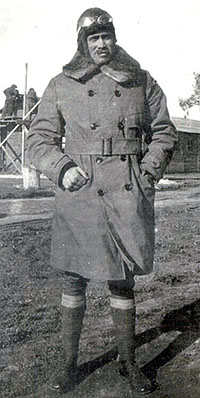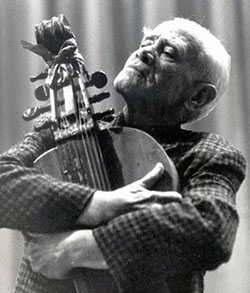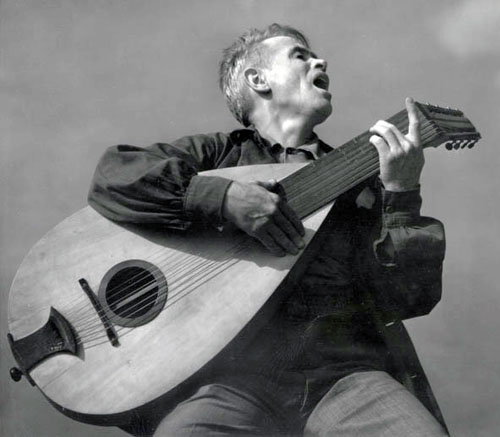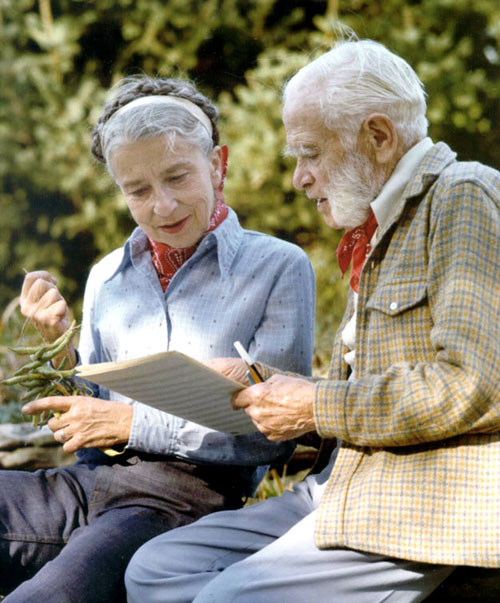John Jacob Niles
Today, John Jacob Niles. The University of Houston's College of Engineering presents this series about the machines that make our civilization run, and the people whose ingenuity created them.
[Open with the phrase, I Wonder as I Wander sung by Jo Stafford]
John Jacob Niles lies on my mind as another Christmas approaches. His song, I wonder as I Wander is one of the season staples. I met Niles at the Episcopal cathedral in Lexington, Kentucky, where I was tenor soloist. That was in the late '60s. I'd loved his music ever since I'd heard him in concert at Oregon State, in the '40s.
 Born in 1892, Niles, wrote the song, Go 'Way from my Window, when he was only fifteen. He flew in reconnaissance planes during WW-I; then stayed in France to study music theory and composition. Back in America, he sang for a while with the Chicago Lyric Opera.
Born in 1892, Niles, wrote the song, Go 'Way from my Window, when he was only fifteen. He flew in reconnaissance planes during WW-I; then stayed in France to study music theory and composition. Back in America, he sang for a while with the Chicago Lyric Opera.
You'd never know any of that from his public persona. Niles portrayed himself as an earthy folksong collector. Later in his life, the "folksongs" he claimed to've collected proved to be unknown in rural communities. He confessed to writing them himself -- based on fragments he'd heard in the backwoods.
Niles sang in an eerie style, mixing his normal voice with a piercing high countertenor. And he was always over the top. He plunged into performance with unnerving passion. At the age of 84, he told my wife and me that he was now in better voice than when I'd heard him in my college days. Of course hyperbole wreathed Niles' every utterance. Yet, when we heard his next concert, we knew he really had drunk some magic elixir of youth.
 He sang to dulcimers that he made for himself. Dwight Newton, expert on such instruments, says that Niles' dulcimers, like his music, were pretty much his own concoctions. And they were rather crude. "Their musical function," he says, "was secondary to their function as theatrical props."
He sang to dulcimers that he made for himself. Dwight Newton, expert on such instruments, says that Niles' dulcimers, like his music, were pretty much his own concoctions. And they were rather crude. "Their musical function," he says, "was secondary to their function as theatrical props."
In any case, one of my favorite among Niles' songs was titled Venezuela, [Audio: Opening phrase of Venezuela.] My sister and I used to sing that one as a round. When I asked Niles if he'd meant it to be a fuguing tune. He looked surprised; that hadn't occurred to him. Well chalk that up to his genius. Just as his stories enlarged on reality, his music held more than it first seemed to. Niles ran in some realm beyond mere intelligence.
Late in life he worked on a large song cycle, based on writings of the monk Thomas Merton. These were no folk songs, nor did Niles sing them. The soprano who did, once told me about a remarkable moment: He seized her arm and, with great intensity, said, "Thomas Merton has taught me the true meaning of humility."
Niles humble? Well, yes. It was a common miscalculation to judge Niles by his onstage persona instead of by his music. A song like I Wonder as I Wander was not stagecraft at all. It was Niles' deep admiration of a world so much more than it first seems to be.
I'm John Lienhard at the University of Houston, where we're interested in the way inventive minds work.
Click here for a brief Niles biography from program notes for one of his concerts. Click here for Dwight Newton's article on Niles' dulcimers.
All images are courtesy of the University of Kentucky Archives/John Jacob Niles Collection. My special thanks to University of Kentucky Archivists Kate Black and Jason Flahardy for their invaluable help.
Audio clips: I Wonder as I Wander: Jo Stafford, Happy Holidays - I Love the Winter Weather, Track 11, Corinthian Records, 1999. Venezuela and Black is the Color of My True Love's Hair: John Jacob Niles, I Wonder as I Wander, Tracks 14 and 13, Essential Media Group, 1957. (Note added on July 15, 2016: Links to some of those clips are dead. I've switched them to You-Tube clips.)


John Jacob Niles, late in life, discussing a manuscript with his wife Rena Niles